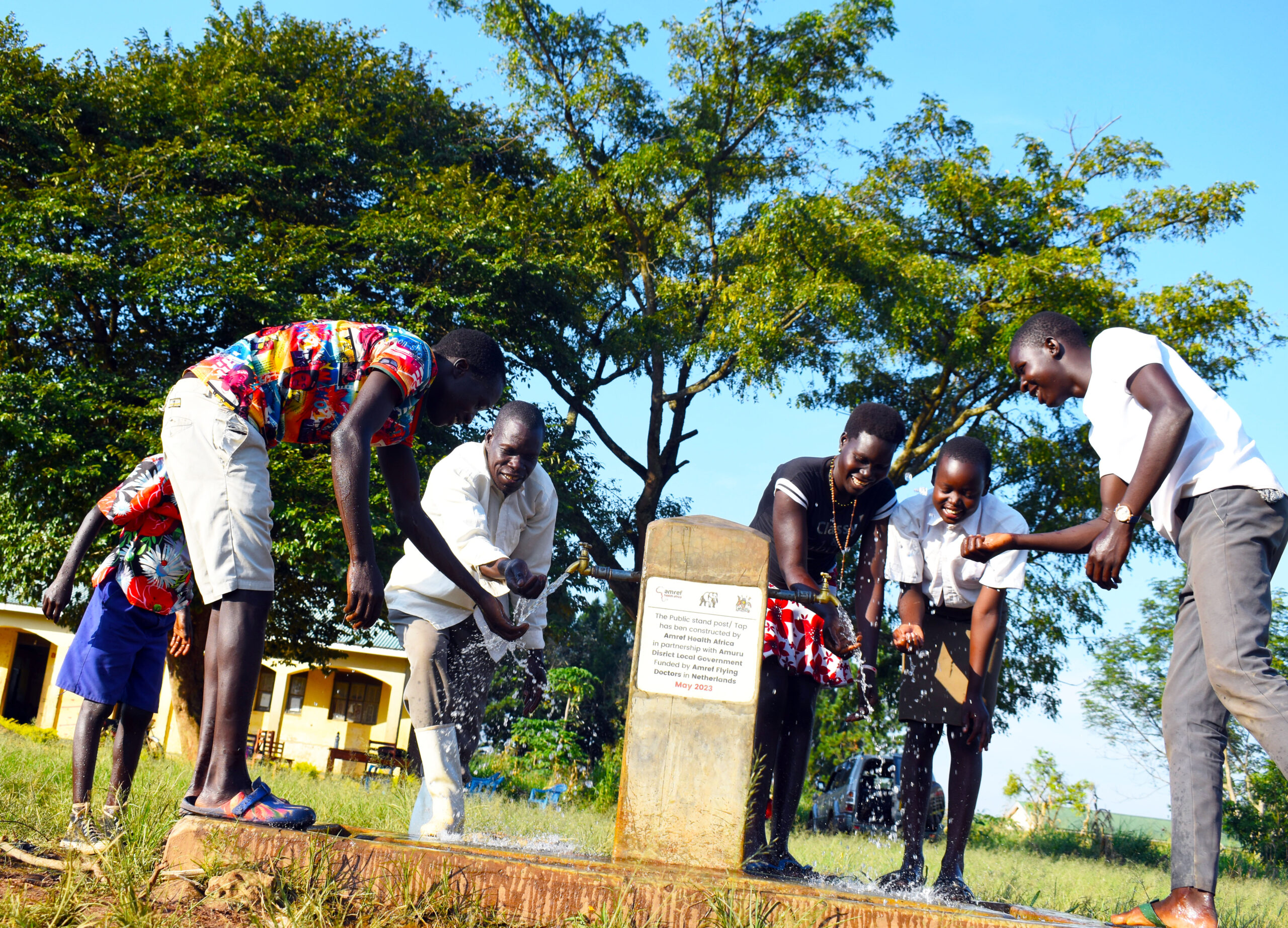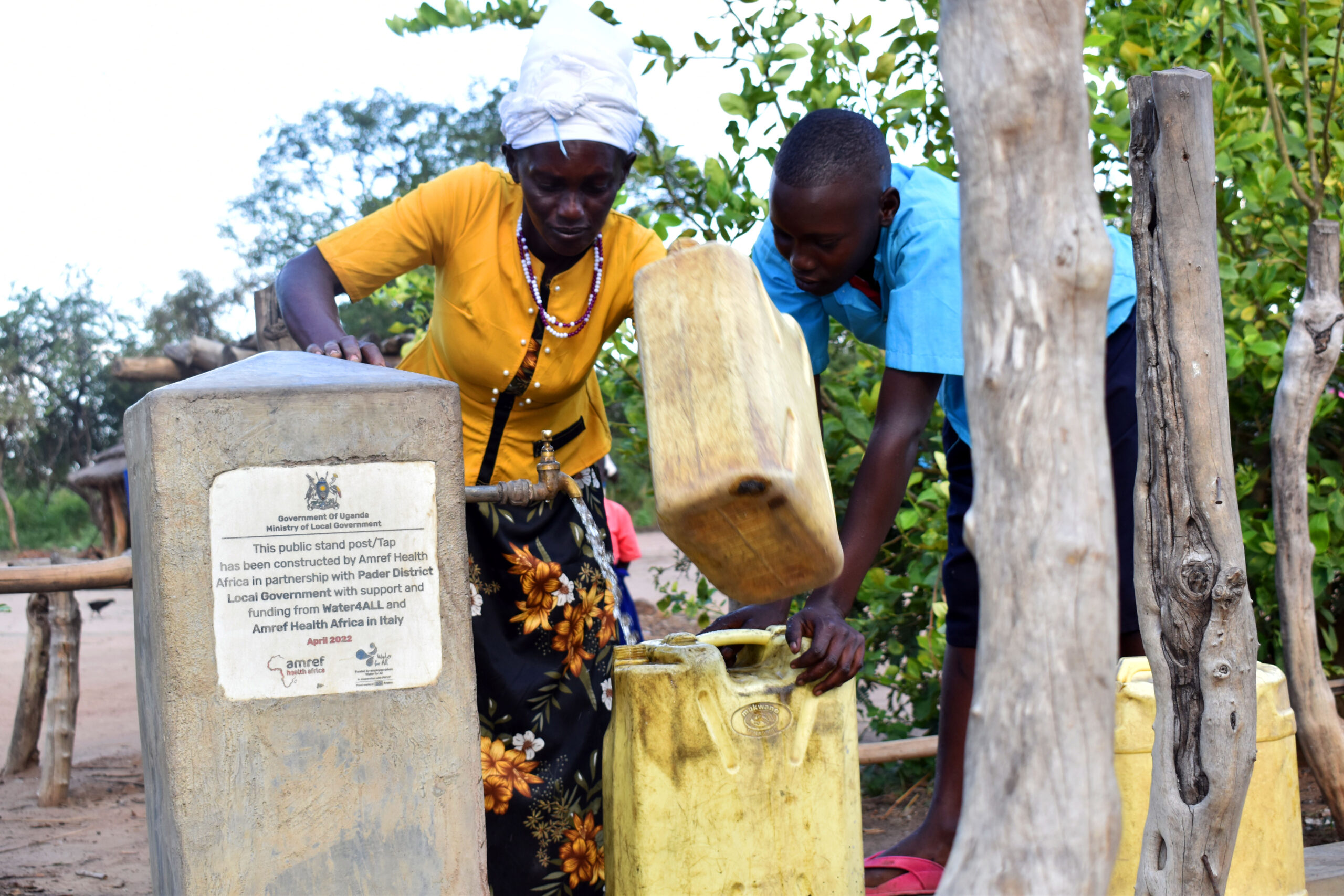Making safe water accessible to all is my goal and that of Amref Health Africa
Friday, 26 February, 2021

Ms. Hajra Comfort Mukasa – Program Manager Water , Sanitation and Hygiene at Amref Health Africa in Uganda
I am Comfort Hajra Mukasa the program manager Water Sanitation and Hygiene (WASH) at AMREF Health Africa in Uganda, the reason why we developed PIWA MALENG PROJECT in Amuru District Lamongi Sub County was because we observed health gaps following our operation research which we under took while implementing a project we coded names Total Health Project. The operation research showed that as much as we wanted to improve RMNCH indicators including increase in attending antenatal or postnatal care we needed to intergrate interventions that will improve WASH conditions in the communities thus contribute to the reduction of Maternal and neonatal that are majorly due to unhygienic conditions in communities. This was because , women did not have sufficient access to water within their community and this was becoming a barrier in access to health care services.
Women used to walk long distances looking for clean water and some missed their antenatal care because they were looking for water, young girls used to miss school due to lack of water, GBV cases were on the increase as girls were sexually harassed by men on their way to the spring wells. Much as we had offered some water sources for the community, we decided to come up with projects specifically focusing on increasing access to safe and clean water so that women are still able to play their role of being the sole providers in their homes and enable them attend their antenatal services. The project was named “PIWA MALENG”, as it was chosen by the community to show ownership and it means “OUR CLEAN WATER.”
I would like to acknowledge the Amuru local government for the meaningful partnership which started with “Total Health Project”. The district supported us in conducting the community assessment, identifying areas with a higher demand, the kind of water sources that were required per community, boreholes to be rehabilitated, community members to work with as well as the Hand Pump Mechanics to be retrained through refresher training.

Water committees are key components that support the communities to maintain cleans surroundings of the water source and also save for maintance in case the bore hole breaks down.

They have also helped us to the monitoring and supervisions the ongoing work, when it comes to the Association of Hand Pump Mechanics, we have been able to build their capacity on repair and maintain the boreholes. For, Lamogi Subcounty we used the government approach of demand-driven whereby communities should demand the water source and the district leaders helped us rise the community capital cost contribution.

Some of the achievements we are proud of includes, “The increased use household latrines by 35% from the baseline, the project has helped us to extend clean and safe water close to the beneficiary and which contributed to the reduction of waterborne diseases. Case of GBV at the community level has reduced, now teenage girls can freely access water for home use without fear for their lives.” She explained.

For the next one year we expect to integrate Sexual Reproductive Health and Rights in the project emphasizing the role of clean water in access SRHR. We are also looking at integrating ending violence against women and young girls in the project and this will comprise of ending child and forced marriages. We also have plans of incorporating the component of men involvement because for this community women are the breadwinners and we want to see men coming on board to support their women.
Amalgamation small entrepreneurship skills, games, and sports in WASH for example football for clear water and netball for safe environments to improve on the economic wellbeing of the community especially among young people and the integration of water solar power source at the community level as a way of curbing the burden women go through when it comes to accessing clean and safe water and also to enable them create time for the side businesses.
“Water in Uganda is free but water services are not free” as Amref Health Africa, we would like to build capacities of all Water Saving Committees so that they fully utilize and plan for all income collected as Community Capacity Servings and also to support our Hands Pump Mechanics through their association with refresh trains on borehole maintenance.
As my call for action, I request that the government increase in the budget allocated to local governments so as to extend social services including access to clean and safe water to their communities, lets also integrate the new innovations in our services, for example, the use of Solar Water Power Systems to easy on the burden of water collection b women and girls.

Let’s also empower communities to institutionalize the projects and let the community serving be used appropriately by investing in small scale impactful businesses at lower levels.

Meet Aciro Alice, Alice is the Chairperson “Water User Committee – Apotokitoo Village, Rwot Kweri – Lamogi SubCounty Sub-county, Amuru district. She’s 42 years old, married with 8 children. Driven by the trust from the community in her village to be the Water User Committee Chairperson has elevated her leadership skills.
Aciro Alice’s main role is to take responsibility for operating and maintaining borehole. She is a farmer who grows maize millet, sorghum, sweet potatoes, cassava, and simsim as well as selling alcohol.
As a committee, we manage our borehole by keeping it and the surroundings clean, also we enforce hygienic practices among water users at the borehole site to prevent water contamination as well as collecting and managing water user fees. We keep records functionality and report back to the community members. She added.
The group act as social safety nets for communities by providing quick financial credit at low-interest rates which have been used to promote other development activities, such as health or literacy training, promotion of products, such as agricultural inputs and other social products.
“As a leader, I have noted that many rural populations in my community have limited access to formal financial institutions, but a growing majority belong to saving groups. These saving groups could have the potential to improve household income, access to health services, and clean water.” She added. Alice, also explained that the Water User Committee in Lamogi SubCounty has the basic required structures; however, challenges exist in relation to training and management of the group and their assets and she called upon the government and development partners working together in providing technical supports for the group.

She notes that before Amref Health Africa in Uganda the rehabilitated the Alegopac Borehole, “the situation was bad, access to clean water was a big challenge which was associated with Gender-Based Violence cases including rapping teenage girls, diseases such as diarrhea, cholera, dysentery, typhoid were on increase. Water sources were far away from their homes which placed their lives at security dangers. “We have been empowered by Amref Health Africa in Uganda with the capacity on how to promote clear water usage, sanitation around our home states and as a business lady, currently fetching water for my production was eased since the borehole is near.

COVID19 Pandemic, we can easily get water for sanitation and this has encouraged all home states to have two TiPTanks (one in front of the house and one at the toilet) all these have been achieved because of Amref Health Africa.
Amref Health Africa teams up with African communities to create lasting health change.







